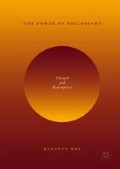Abstract
The ontological character of its own movement remains obscure to thought, a condition that needs to be remedied in any serious attempt to think. From multiple angles we have looked at the pre-occupations of thought as it refuses to think, that is, refuses to think what most needs to be thought about, which is its own condition of possibility. Given this backdrop, we obtain some deductions in the form of a propositional arrangement, a deliberately chosen format, that allows us to survey what thinking can disclose to itself about itself. The inner daguerreotype is suggestive of the uncritical self-image of thought that is built up through memory accretions. So long as thought remains invested in the daguerreotype (its inner picture of itself), it remains divided against itself, incapable of truly thinking—the self-image is a schism in thought maintained through and by division. By means of the propositions in this chapter the attempt is to deconstruct the image and go beyond the daguerreotype so that new light is thrown on the operation of thought. We begin with simple observations drawing our means from Heidegger, Schelling, Goethe, and Heraclitus.
Access this chapter
Tax calculation will be finalised at checkout
Purchases are for personal use only
Notes
- 1.
Martin Heidegger , Discourse on Thinking (New York: Harper and Row, 1966), pp. 45–46.
- 2.
Theodor Adorno wrote: “The only philosophy which would still be accountable in the face of despair, would be the attempt to consider all things, as they would be portrayed from the standpoint of redemption . Cognition has no other light than that which shines from redemption out upon the world; all else exhausts itself in post-construction and remains a piece of technics. Perspectives must be produced which set the world beside itself, alienated from itself, revealing its cracks and fissures, as needy and distorted as it will one day lay there in the messianic light. To win such perspectives without caprice or violence, wholly by the feel for objects, this alone is what thinking is all about. It is the simplest of all things, because the condition irrefutably call for such cognitions, indeed because completed negativity, once it comes fully into view, shoots [zusammenschiesst] into the mirror-writing of its opposite. But it is also that which is totally impossible, because it presupposes a standpoint at a remove, were it even the tiniest bit, from the bane [Bannkreis] of the existent; meanwhile every possible cognition must not only be wrested from that which is, in order to be binding, but for that very reason is stricken with the same distortedness and neediness which it intends to escape. The more passionately thought seals itself off from its conditional being for the sake of what is unconditional, the more unconsciously, and thereby catastrophically, it falls into the world. It must comprehend even its own impossibility for the sake of possibility. In relation to the demand thereby imposed on it, the question concerning the reality or non-reality of redemption is however almost inconsequential.” Theodor Adorno , Mimima Moralia: Notes from the Damaged Life (London: The New Left Press, 1974), p. 4.
- 3.
Heidegger , Discourse on Thinking , pp. 46–47.
- 4.
Ibid., pp. 54–55.
- 5.
Giorgio Agamben , The Time That Remains: A Commentary on Paul ’s Letter to the Romans (Stanford: Stanford University Press, 2005), p. 68.
- 6.
Aristotle , cited in Giorgio Agamben , What Is an Apparatus and Other Essays, trans. David Kishik (Stanford: Stanford University Press), pp. 32–33.
- 7.
Ivan Illich , The Rivers North of the Future (Toronto: House of Anansi Press, 2005), p. 161.
- 8.
Albert Camus , The Rebel, trans. Anthony Bower (New York: Knopf, 1956).
- 9.
Giorgio Agamben , The Man Without Content, trans. Georgia Albert (Stanford: Stanford University Press), p. 23.
- 10.
Karl Marx , Early Writings, trans. Rodney Livingstone (New York: Penguin Books, 1992).
- 11.
Ibid., p. 258.
- 12.
Ivan Illich , Rivers North of the Future: The Testament of Ivan Illich (Toronto: The House of Anansi Press, 2005), p. 93.
- 13.
Illich, op. cit., p. 96.
References
Adorno, Theodor. Mimima Moralia: Notes from the Damaged Life. London: The New Left Press, 1974.
Agamben, Giorgio. The Man Without Content. Translated by Georgia Albert. Stanford: Stanford University Press, 1999.
Agamben, Giorgio. The Time That Remains: A Commentary on Paul’s Letter to the Romans. Stanford: Stanford University Press, 2005.
Agamben, Giorgio. What Is an Apparatus and Other Essays. Translated by David Kishik. Stanford: Stanford University Press, 2009.
Benjamin, Walter. Illuminations. Translated by Harry Zohn, New York: Schocken Books, 1969.
Camus, Albert. The Rebel. Translated by Anthony Bower. New York: Knopf, 1956.
Fisher, Ernst. The Necessity of Art: A Marxist Approach. Translated by Anna Bostock. Harmondsworth, UK: Penguin Books, 1963.
Heller-Roazen, Daniel. “Editor’s Introduction.” In Potentialities: Collected Essays in Philosophy, edited by Giorgio Agamben. Stanford: Stanford University Press, 2009.
Illich, Ivan. The Rivers North of the Future: The Testament of Ivan Illich. Toronto: House of Anansi Press, 2005.
Marx, Karl. Early Writings. Translated by Rodney Livingstone. New York: Penguin Books, 1992.
Author information
Authors and Affiliations
Corresponding author
Rights and permissions
Copyright information
© 2018 The Author(s)
About this chapter
Cite this chapter
Roy, K. (2018). Beyond the Inner Daguerreotype. In: The Power of Philosophy. Palgrave Macmillan, Cham. https://doi.org/10.1007/978-3-319-96911-4_7
Download citation
DOI: https://doi.org/10.1007/978-3-319-96911-4_7
Published:
Publisher Name: Palgrave Macmillan, Cham
Print ISBN: 978-3-319-96910-7
Online ISBN: 978-3-319-96911-4
eBook Packages: Religion and PhilosophyPhilosophy and Religion (R0)

